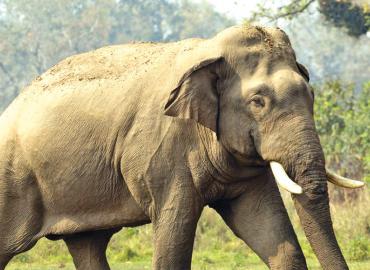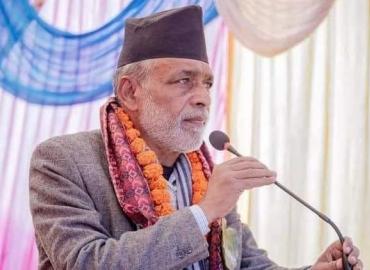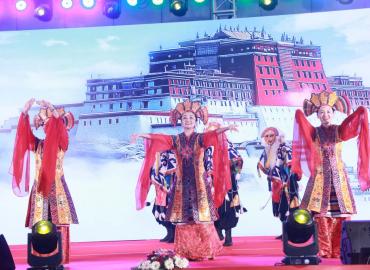Urlabari, Aug. 27: What the ruling and opposition parties did in Koshi Provincial Assembly (PA) on August 21 was an example of instability in provincial government. "We are a democratic country, but these steps of the ruling and opposition political parties in Koshi Province show the unhealthy political game," said Kashi Raj Dahal, a constitution expert.
As the post of the Koshi PA Speaker is vacant, Deputy Speaker Srijana Danuwar, who was elected from CPN-UML, called the Koshi PA meeting for August 21 as Koshi's Chief Minister Uddhav Thapa, representing Nepali Congress (NC), decided to seek vote of confidence to continue his tenure as the CM.
However, Deputy Speaker Danuwar flew to Kathmandu on the day of the meeting inviting a new mess. In the absence of the Speaker and Deputy Speaker, the seniormost member has to chair the meeting.
The eldest member of Koshi PA is Gayananda Mandal, a member from NC. Knowing that Mandal would have to chair the meeting in the absence of the speakers, he was appointed a state minister by the provincial government. After that, the eldest members were from the opposition parties allowing the caretaking coalition to gather a majority. CPN-UML then played another card by making a majority of the eldest members absent during the meeting on August 21.
Four PA members were assigned with the duty to run the PA meeting in the absence of the Speaker and Deputy Speaker. Deputy Speaker Danuwar had assigned the duty of running the PA meeting to Israil Mansuri of NC in her absence as the seniormost PA member Malati Kumari Limbu and the next seniormost Ambar Bahadur Bista notified that they would be absent from the August 18 meeting.
The absence of the Deputy Speaker and elder members was intended to make CM Thapa unable to garner confidence votes, because, in their absence, a member from either the NC or the CPN (Maoist Centre) had to chair the meeting. As the ruling parties have only 47 members in the 93-member Koshi PA and when the chair cannot vote unless there is a tie, there was no chance for Thapa to show his majority unless he got the vote from the chair.
Things happened as planned by the UML. NC’s Israil Mansuri not only chaired the meeting but also voted in favour of Thapa and the Supreme Court (SC) invalidated it in an interim order on August 24.
Earlier, Thapa's appointment was invalidated for showing the support of Speaker Baburam Gautam during the formation of the government.
Although the SC in its verdict on July 27 had invalidated Thapa's appointment for seeking the support of the Speaker, the NC and the ruling coalition proved their majority by seeking the vote of the assembly chair. These all culminated in the SC's verdict on August 24.
Because of intense enmity between the ruling coalition and UML, Koshi Province has had three governments in nine months after the provincial elections on November 20, 2022.
After the SC on Thursday invalidated the vote of confidence garnered by CM Thapa, chances have become high for the formation of a minority government under the CPN-UML and holding a snap poll. "The instability is a result of a lack of political consensus between the parties represented in Koshi PA. The ruling coalition uses the Speaker for a mathematical majority and the members of the opposition coalition remain absent questioning fairness.
None have shown conviction towards best practice," said Dahal, who is also the writer of a book 'Constitutional Culture and Judicial Activisim'.
Scenarios in Koshi Province and the power equation in Kathmandu show that a consensus among the parties in Koshi PA looked difficult. The instability has not only prevented the province from bringing a budget for the fiscal year 2023/24 in more than a month, but the parties have been resorting to unconstitutional steps to be the ruling party.
The SC's interim order on August 24 directed the Uddhav Thapa-led Koshi provincial government to not take any long-term decision calling the Chief Minister’s confidence votes garnered on August 21 as unconstitutional.
It was the second time that the Thapa-led government was reduced to a caretaker one by the SC in less than a month. As the Thapa-led government is now only a caretaker, Koshi PA members are waiting for the final verdict of the apex court on the issue.
Alongside the instability in the government formation, the province has also been struggling with protests against the province’s nomenclature. Koshi, earlier Province 1, was the last of the seven provinces to have an official name on March 1, 2023. One individual has died and hundreds of others have been injured in the protests continuing across the province for around six months.
Despite the inability to reach an agreement and form a government under the majority provisioned by the Constitution of Nepal, Koshi PA members from all the parties argued that they were not in support of mid-term elections.
UML’s Hikmat Bahadur Karki was appointed the Chief Minister of the province in support of the CPN (Maoist Centre), Janata Samajwadi Party-Nepal (JSP-N) and Rastriya Prajatantra Party (RPP) on January 8, 2023, by Province Chief Parashuram Khapung under Article 168(2) of the Constitution. Karki had claimed the CM’s post with the support of 60 out of the 92 members. He was supported by 40 members of CPN-UML, 13 of CPN (Maoist Centre), six of RPP and one of JSP-N.
According to Article 168(2), in cases where no party has a clear majority in the PA under clause (1), the Chief of Province shall appoint as the Chief Minister a member of the PA who can command a majority with the support of two or more parties represented in the PA.
But in a sudden turn of events, CPN (Maoist Centre) Chairman Pushpa Kamal Dahal “Prachanda” had to gather a vote of confidence as the Prime Minister with NC lawmakers by breaking up with CPN-UML. CPN (Maoist Centre) then started a coalition with NC, CPN (Unified-Socialist) and JSP-N.
Following the events, CPN (Maoist Centre) PA members, in June 2023, decided to withdraw their support to Koshi CM Karki. He was then left with the option of getting a vote of confidence within 30 days to continue his tenure as the CM.
On June 30, 2023, Karki failed to get the vote of confidence and was relieved of his post. As a new coalition was formed, NC’s Uddhav Thapa then claimed the CM’s post on July 6.
Consensus difficult due to differences
However, Thapa’s appointment was questioned under the grounds of majority. After the breakup between CPN-UML and CPN (Maoist Centre), Koshi PA had a delicate power equilibrium. The alliance of CPN (Maoist Centre), NC, CPN (US) and JSP-N have 47 seats in the Koshi PA and the alliance of CPN-UML and RPP has 46 seats. By electing a CPN (Maoist Centre) member the Speaker of Koshi PA, the former alliance also had 46 seats.
Baburam Gautam, a Koshi PA member from CPN (Maoist Centre), was elected the Speaker of Koshi PA on January 12, 2023.
As NC’s Thapa did not have a majority with 46 seats each with both sides, Thapa had claimed for the CM’s post in July with an extra signature of Speaker Gautam to make the count ‘47’.
Former CM Karki then reached the SC on July 7 and filed a petition against Thapa for including the Speaker’s signature. The SC, on July 27, stated that the Speaker cannot extend his/her support unless required to break a tie regarding legislative issues.
The decision from the SC then led the Koshi Province Chief to call the parties to form a government within a week. As Karki’s UML and RPP did not have a majority, Thapa’s NC and coalition decided to exercise a new strategy.
After Gautam resigned as the Speaker, the post was vacant. Then, with 47 signatures of Koshi PA members, Thapa once again claimed the CM’s post and got appointed.
But the Constitution compelled Thapa to gain the vote of confidence within 30 days after such an appointment. However, when Thapa was ready to get the votes after Deputy Speaker Danuwar called the meeting for August 21, the absence of the Deputy Speaker and senior members of the PA led the ruling coalition to take the vote from temporary chair Ansari. After that, the CPN-UML reached the SC once again leading the Thapa-led government to function as a caretaker following the interim order on August 24.
The SC will give a final hearing into the case on September 1. After the final verdict, CPN-UML is looking forward to leading the province under Article 168(3) of the Constitution of Nepal.
“If the Chief Minister fails to secure a vote of confidence, the Chief of Province shall appoint the parliamentary party leader of the party which has the highest number of members in the PA as the Chief Minister,” read Article 168(3).
CPN-UML is the largest party in Koshi PA with 40 seats and Karki is its parliamentary party leader. But he needs to gain confidence votes if he gets appointed the CM again, and it is difficult.
What do Koshi PA members say?
Bhupendra Rai, NC’s chief whip for Koshi PA, said that they were still hoping that the final verdict of the SC could come contrary to the interim order. “If not, the CPN-UML will form the government. However, it will not get the majority of the confidence votes. We will then have to follow Article 168(5),” said Rai.
According to Article 168(5), in cases where the CM appointed under clause (3) fails to obtain a vote of confidence under clause (4) and any member under clause (2) presents a ground on which he or she can obtain a vote of confidence in the PA, the Chief of Province shall appoint such a member as the CM.
“There is still a provision allowing the government formation, so we should not be thinking of going to mid-term elections. We will be clearer once the final verdict of the SC arrives,” Rai stressed.
According to Rewati Raman Bhandari, CPN-UML’s chief whip for Koshi PA, the difficulties in forming UML’s government in the province were a result of the differences between the parties in the centre.
“If the province-level party committee was allowed to do what’s best, this scenario would have never transpired. It is clearly visible that neither of the two coalitions have a majority. Despite it, unconstitutional moves are being taken again and again,” said Bhandari.
Gita Timsina, a Koshi PA member from CPN (Maoist Centre), said that all the parties should become more responsible and find a solution through the assembly.
“The voters elected the current members for five years. We should not let the hopes of the voters get shattered while seeking a majority with the difficult mathematics of the seats of the current coalitions. We cannot make them vote again due to trivial matters,” said Timsina.
However, Timsina stressed that Mansuri only chaired the meeting in the absence of the Speaker and Deputy Speaker and was still a member of Koshi PA. “This is why there is a chance that the SC’s final verdict will allow the current government to continue,” she added.
If the verdict is contrary to their hope, Timsina said that the government would be formed either under Articles 168(3) of 168(5) of the Constitution.
Meanwhile, Kamal Prasad Jabegu, a Koshi PA member from CPN (US), said that the members should be more responsible towards the province.
“We should follow the party because we won after it gave us the ticket to contest the election. However, the central leadership should be aware that the provincial committees should be given a little freedom to solve province-level issues,” said Jabegu.
Jabegu added, “Koshi Province is in a mess. The province will not have a budget for the fiscal year on time due to the current differences. Development works will also come to a halt soon.”






















